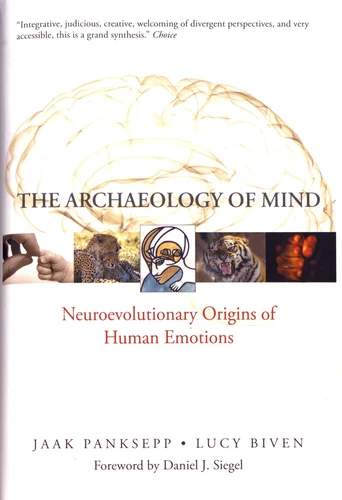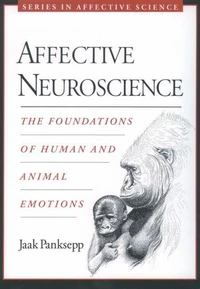The Archaeology of Mind. Neuroevolutionary Origins of Human Emotions
Par : ,Formats :
Actuellement indisponible
Cet article est actuellement indisponible, il ne peut pas être commandé sur notre site pour le moment. Nous vous invitons à vous inscrire à l'alerte disponibilité, vous recevrez un e-mail dès que cet ouvrage sera à nouveau disponible.
- Nombre de pages562
- PrésentationRelié
- FormatGrand Format
- Poids1.128 kg
- Dimensions16,4 cm × 24,3 cm × 4,5 cm
- ISBN978-0-393-70531-7
- EAN9780393705317
- Date de parution17/09/2012
- CollectionNorton Series on Interpersonal
- ÉditeurNorton & Company
- PréfacierDaniel J. Siegel
Résumé
What makes us happy ? What makes us sad ? How do we come to feel a sense of enthusiasm ? What fills us with lust, anger, fear, or tenderness ? Traditional behavioral and cognitive neuroscience have yet to provide satisfactory answers. The Archaeology of Mind presents an affective neuroscience approach—which takes into consideration basic mental processes, brain functions, and emotional behaviors that all mammals share—to locate the neural mechanisms of emotional expression.
It reveals—for the first time—the deep neural sources of our values and basic emotional feelings. This book elaborates on the seven emotional systems that explain how we live and behave. These systems originate in deep areas of the brain that are remarkably similar across all mammalian species. When they are disrupted, we find the origins of emotional disorders : SEEKING : how the brain generates a euphoric and expectant response.
FEAR : how the brain responds to the threat of physical danger and death.
It reveals—for the first time—the deep neural sources of our values and basic emotional feelings. This book elaborates on the seven emotional systems that explain how we live and behave. These systems originate in deep areas of the brain that are remarkably similar across all mammalian species. When they are disrupted, we find the origins of emotional disorders : SEEKING : how the brain generates a euphoric and expectant response.
FEAR : how the brain responds to the threat of physical danger and death.
What makes us happy ? What makes us sad ? How do we come to feel a sense of enthusiasm ? What fills us with lust, anger, fear, or tenderness ? Traditional behavioral and cognitive neuroscience have yet to provide satisfactory answers. The Archaeology of Mind presents an affective neuroscience approach—which takes into consideration basic mental processes, brain functions, and emotional behaviors that all mammals share—to locate the neural mechanisms of emotional expression.
It reveals—for the first time—the deep neural sources of our values and basic emotional feelings. This book elaborates on the seven emotional systems that explain how we live and behave. These systems originate in deep areas of the brain that are remarkably similar across all mammalian species. When they are disrupted, we find the origins of emotional disorders : SEEKING : how the brain generates a euphoric and expectant response.
FEAR : how the brain responds to the threat of physical danger and death.
It reveals—for the first time—the deep neural sources of our values and basic emotional feelings. This book elaborates on the seven emotional systems that explain how we live and behave. These systems originate in deep areas of the brain that are remarkably similar across all mammalian species. When they are disrupted, we find the origins of emotional disorders : SEEKING : how the brain generates a euphoric and expectant response.
FEAR : how the brain responds to the threat of physical danger and death.



